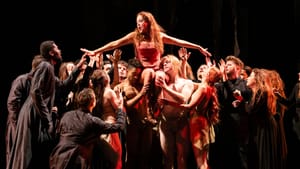Stay in the Loop
BSR publishes on a weekly schedule, with an email newsletter every Wednesday and Thursday morning. There’s no paywall, and subscribing is always free.
The opera that wasn’t meant to be
Festival O19: Opera Philadelphia presents Handel and Cosgrove's ‘Semele’

Handel never intended for his 1744 oratorio Semele to be staged as a proper opera, but that hasn’t stopped intrepid directors from putting their stamp on the work. Since the full-scale rediscovery of the Baroque composer’s corpus began in earnest half a century ago, this story of a mortal woman’s destructive love affair with the Roman god Jupiter has proved catnip to creative auteurs. These directors did bring some thought to the table, however misguided it may have been in certain cases. Thought is what James Darrah’s production for Opera Philadelphia’s Festival O19 largely lacks.
Past productions reconceived the central pair as Marilyn Monroe and President Kennedy, or transported the action to old Hollywood. One particularly inventive staging, available on DVD, drew parallels to Princess Diana. Darrah—who brilliantly staged the company’s world premiere of Missy Mazzoli’s Breaking the Waves in 2016—takes a largely static work and swaddles it in a muddled, monochromatic mise en scène, making it even more dramatically inert than usual.
Seeking character
Cameron Mock and Emily MacDonald’s scenic design suggests a post-apocalyptic former forest, with ugly swaths of cloth suspended from the ceiling of the Perelman Theater’s stage and ashy rubble littering the floor. Sarah Schuessler’s costumes suggest the sales rack at H&M, with a few exceptions: the immortal characters are done up like attendees at a Star Trek convention, and some of the male choristers are fitted with beige loincloths that resemble ungainly adult diapers.
The action across the three-hour running time is difficult to follow, largely because Darrah expends little energy in defining character. Semele (soprano Amanda Forsythe); her sister, Ino (mezzo Daniela Mack); her father, Cadmus (bass Alex Rosen); and her fiancé, Athamas (countertenor Tim Mead) all enter the action without much explanation in the first act, and it takes a fair amount of time and sleuthing for the audience to understand the characters’ relationships to each other.
Virtues in dance and music
Darrah seems more concerned with dance, which becomes the prime dramaturgical device employed throughout. Choreographer Gustavo Ramirez Sansano creates a striking physical language—particularly for principal dancer Lindsey Matheis, who serves as a doppelgänger for Mack’s Ino, expressing the character’s emotion while Mack sings. However lithe and talented Matheis may be, the device proves distracting and distancing—a shame, since Mack sings “Turn, hopeless lover,” Ino’s Act I aria of longing, with such piquant emotion.
Overall, the musical virtues of the evening were high, if not flawless. Mack has been something of an MVP with Opera Philadelphia in recent seasons, dazzling in the world premiere of Elizabeth Cree and as Carmen. (She returns in January to sing the alto solo in Verdi’s Requiem.) Her plangent mezzo suits Ino’s music well, though she sounds less comfortable when she reappears as the goddess Juno, intent on wresting Semele from her husband’s affections. Juno’s furious “Hence Iris, hence away” lacked the vocal pyrotechnics and the appropriate indignation to make it a showstopper.

Energy, gravitas, and poise
Forsythe possesses a voice more suited to sacred music and the art song than opera, but she acquitted herself well overall, especially in the ravishing “O sleep, why dost thou leave me?” She deserves credit for fording the long role, with its many arias, without noticeably tiring.
Tenor Alek Shrader brought a welcome caddishness to his portrayal of Jupiter. His voice remains attractive and pliant in the middle register, though top notes are becoming hard won. On the lower end of the vocal spectrum, the young Rosen displayed a sturdy, well-developed sound that suggests we will be hearing more of him in the future.
Mead—a striking Oberon in Opera Philadelphia’s A Midsummer Night’s Dream earlier this year—has more vocal gravitas than most countertenors. The production does him no favors by moving Athamas’s Act III showpiece aria “Despair no more shall wound me” to the first act, at which point Mead’s voice was not sufficiently warmed up. Still, he dispatched the lovely music honorably, if not brilliantly.
Perhaps the most successful overall performance of the evening belonged to Curtis-trained soprano Sarah Shafer, who sang the relatively brief role of Iris with notable beauty, and acted with wit and vibrancy. (Her costume—a stylish white jumpsuit and perilously high heels—also takes the award for most flattering ensemble.) The chorus, under Elizabeth Braden’s preparation, also performed with poise, and managed to overcome as much of the director’s silly stage business as possible.
Historically informed
Conductor Gary Thor Wedow helmed solos with gusto, but he failed to establish a musical through-line between aria and recitative. The disjunction made a long evening feel even longer. The orchestra pit contained period-specific instruments (theorbo and harpsichord), and Wedow’s approach suggested historically-informed performance practices. Am I the only person who wishes for a little tastelessness in this music and a little less scholarship?
In terms of tastelessness, I guess I’ll have to go back to Semele-as-Princess Di.
What, When, Where
Semele. By George Frideric Handel and William Cosgrove. Directed by James Darrah. Opera Philadelphia. Through September 28, 2019, at the Kimmel Center’s Perelman Theater, 300 S. Broad Street, Philadelphia. (215) 732-8400 or operaphila.org.
All theater spaces within the Kimmel Center have wheelchair-accessible seating locations. Patrons can purchase accessible seating online or by calling (215) 893-1999, or by emailing [email protected]. Companion seating for paid personal-care attendants is provided at no cost with a paid admission.
Sign up for our newsletter
All of the week's new articles, all in one place. Sign up for the free weekly BSR newsletters, and don't miss a conversation.

 Cameron Kelsall
Cameron Kelsall